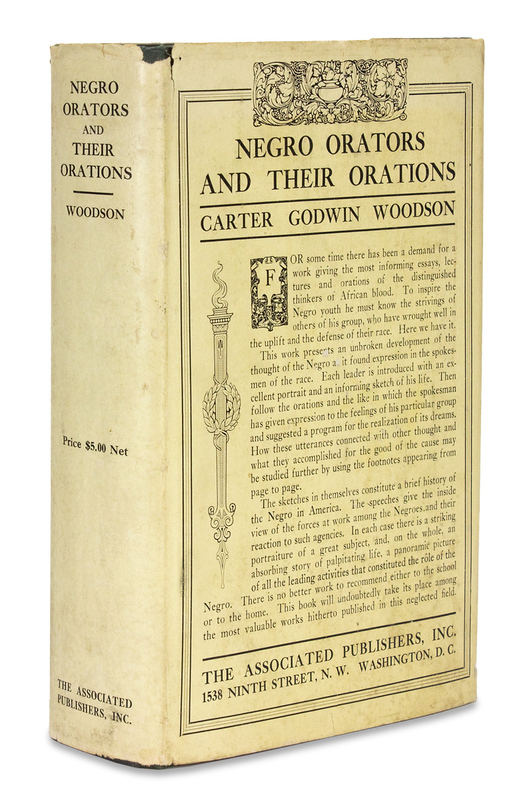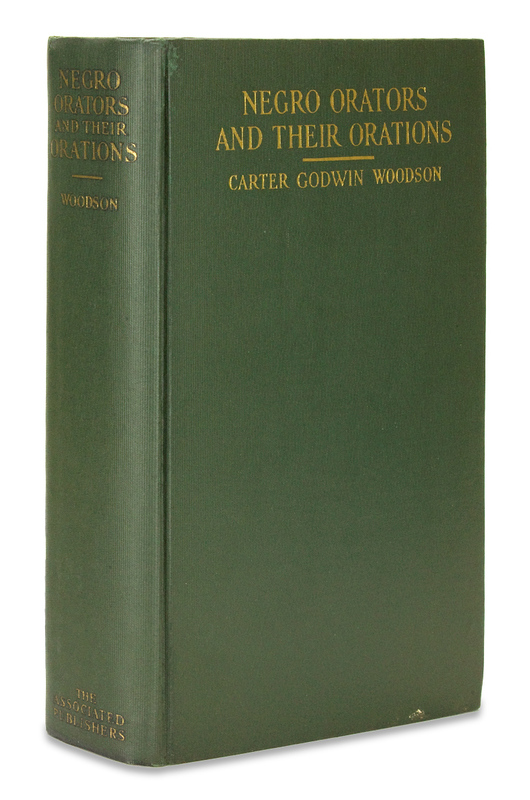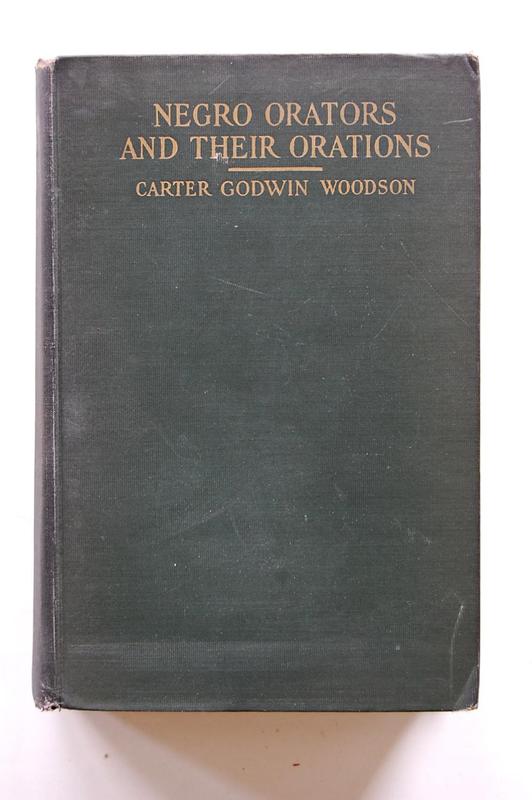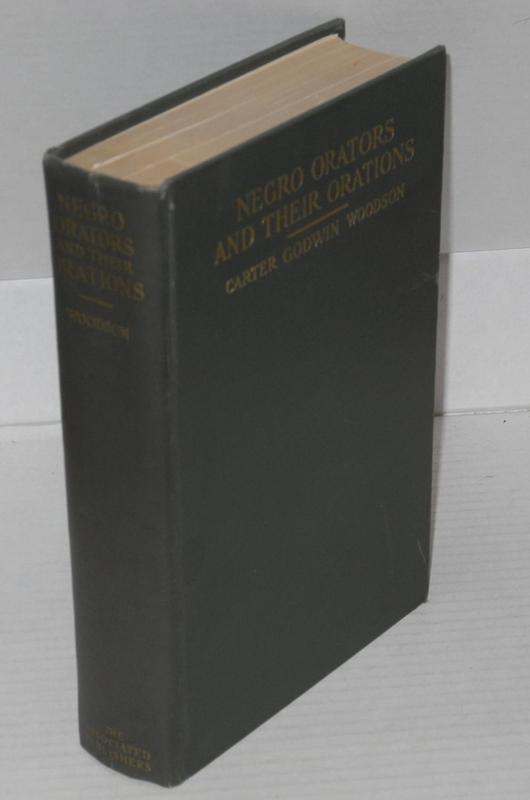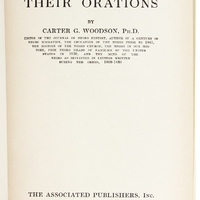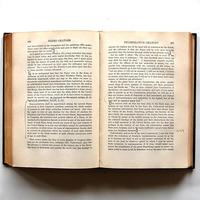-
Title
-
Negro Orators and Their Orations
-
This edition
-
"Negro Orators and Their Orations" . Ed. Carter G. Woodson. Washington, DC: Associated Publishers, 1925. xi+711 pp.
-
Other editions, reprints, and translations
-
• Repr. New York: Russell and Russell, 1969. xi+711 pp.
-
Table of contents
-
I. Introduction (1)
II. The First Protest (13)
● "Othello" / Negro Slavery (14)
● "A Free Negro" / Slavery (25)
III. More Forceful Attacks (31)
● Peter Williams / Oration on the Abolition of the Slave Trade (32)
● James Forten / A Late Bill before the Senate of Pennsylvania (42)
● James Forten and Russell Perrott / An Address to the Humane and Benevolent Inhabitants of the City and County of Philadelphia (52)
● Prince Saunders / Promoting the Abolition of Slavery and Improving the Condition of the African Race (56)
● N. Paul / The Abolition of Slavery in New York (64)
● Peter Williams / Slavery and Colonization (77)
● Theodore S. Wright / The Progress of the Antislavery Cause (86)
● Theodore S. Wright / Prejudice Against the Colored Man (92)
IV. Further Efforts for a Hearing (96)
● Robert Purvis / Appeal of Forty Thousand Citizens Threatened with Disfranchisement (96)
● William Whipper / Non-resistance to Offensive Aggression (104)
● James McCune Smith / The Abolition of Slavery and the Slave Trade (119)
V. The Oratory of the Crisis (125)
● Charles Lenox Remond / Slavery as It Concerns the British (127)
● Charles Lenox Remond / Slavery and the Irish (131)
● Charles Lenox Remond / The Rights of Colored Citizens in Traveling (144)
● Henry Highland Garnet / An Address to the Slaves of the United States of America (150)
● Frederick Douglass / Reception Speech at Finsbury Chapel, Moorfield, England, May 12, 1846 (158)
● Frederick Douglass / Speech at Glasgow, Scotland, May 29, 1846 (170)
● Frederick Douglass / Speech in Faneuil Hall, June 8, 1849 (178)
VI. The Oratory of Defiance (192)
● Samuel R. Ward / Speech on the Fugitive Slave Bill (193)
● Frederick Douglass / Speech at Rochester, July 5, 1852 (197)
● Frederick Douglass / The Slavery Party (223)
● Charles Lenox Remond / Speech before the New England Antislavery Convention, 1854 (229)
● Charles Lenox Remond / An Antislavery Discourse (237)
● Theodore Holly / The Auspicious Dawn of Negro Rule (242)
● Frederick Douglass / A Union Speech (247)
● Frederick Douglass / "Men of Color, to Arms" (253)
● J. Sella Martin / A Speech before the Paris Antislavery Conference, August 27, 1867 (256)
VII. Deliberate Oratory, Speeches of Negro Congressmen (262)
● John Willis Menard / The Negro's First Speech in Congress (263)
● B. K. Bruce / An Address before the United States Senate in Behalf of Admitting P. B. S. Pinchback as Senator from Louisiana (267)
● B. K. Bruce / A Speech on Election Practices in Mississippi (270)
● John R. Lynch / A Speech in the Case of a Contested Election (273)
● Hiram R. Revels / A Speech on the Georgia Bill (286)
● Jefferson F. Long / A Speech on Disorders in the South (294)
● R. C. DeLarge / A Speech on the Enforcement of the Fourteenth Amendment (295)
● Joseph H. Rainey / The Southern Situation (300)
● R. B. Elliott / A Speech on the Civil Rights Bill (309)
● Richard H. Cain / A Speech on the Civil Rights Bill (328)
● James T. Rapier / A Speech on the Civil Rights Bill (338)
● John R. Lynch / A Speech on the Civil Rights Bill (356)
● Joseph H. Rainey / A Speech on South Carolina (378)
● Joseph H. Rainey / A Speech on Education (380)
● J. M. Langston / A Speech Laudatory of the Negro (387)
● George H. White / A Speech in Defense of the Negro Race (403)
VIII. Speeches of Negro Congressmen Outside of Congress (411)
● A. J. Ransier / Speech Delivered at Charleston, S.C., March 9, 1871 (411)
● J. M. Langston / The Other Phase of Reconstruction (417)
● J. M. Langston / Equality Before the Law (436)
IX. Oratory in the Solution of the Race Problem (452)
● Frederick Douglass / The Negro Exodus from the Gulf States (453)
● R. T. Greener / The Emigration of Colored Citizens from the Southern States (473)
● Joseph C. Price / The Race Problem Stated (488)
X. The Panegyric (502)
● Robert B. Elliott / Eulogy on Charles Sumner (502)
● Frederick Douglass / An Oration in Memory of Abraham Lincoln (516)
● Booker T. Washington / An Address Delivered at the Dedication of the Robert Gould Shaw Monument at Boston, May 31, 1897 (527)
● Bishop Reverdy C. Ranson / William Lloyd Garrison : A Centennial Oration (531)
● M. C. B. Mason / Lincoln, the Man of the Hour (541)
● Bishop Alexander Walters / Abraham Lincoln and Fifty Years of Freedom (554)
● William H. Lewis / An Address Before the Massachusetts House of Representatives, February 12, 1913 (562)
● Robert Rusa Moton / The Negro's Debt to Lincoln (573)
XI. Optimistic Oratory (579)
● Booker T. Washington / An Address Delivered at the Opening of the Cotton States' Exposition in Atlanta, Georgia, September, 1895 (580)
● Booker T. Washington / An Address Delivered at the Harvard Alumni Dinner in 1896 (584)
● Roscoe Conkling Bruce / Freedom Through Education (585)
● William H. Lewis / Booker T. Washington, a Lover of His Fellowmen (596)
● Robert R. Moton / A Life of Achievement (602)
● Emmett J. Scott / Memorial Address Delivered at the Seventeenth Annual Session of the National Negro Business League, Kansas City, Missouri, August 16, 1916 (607)
XII. Occasional Oratory (617)
● Bishop W. T. Vernon / A Plea for a Suspension of Judgment (618)
● Bishop R. A. Carter / Whence and Whither? (626)
● Bishop G. C. Clement / Boards for Life's Building (637)
● C. V. Roman / A Knowledge of History Conducive to Racial Solidarity (643)
XIII. Progressive Oratory (653)
● William Pickens / The Kind of Democracy the Negro Race Expects (654)
● Mordecai Wyatt Johnson / The Faith of the American Negro (658)
● James Weldon Johnson / Our Democracy and the Ballot (663)
● Archibald H. Grimké / The Shame of America (671)
● Francis J. Grimké / Victory for the Allies and the United States a Ground of Rejoicing, of Thanksgiving (690)
Index (709)
-
About the anthology
-
• Includes a 12-page introduction as well as brief (1-page) section introductions for each of the twelve subsequent sections. Woodson provides annotations to references made in the speeches and gives a brief biographical footnote and the source of many of the texts (although no source is provided for 23 of the selections--though a number of them may have been published as pamphlets under their titles as given here).
• The anthology presents 74 items by 47 named authors and two pseudonymous authors ("Othello" and "A Free Negro"). Includes 9 items by Frederick Douglass and 5 by Charles Lenox Remond, as well as 3 each by Booker T. Washington, J. M. Langston, and Joseph H. Rainey.
• The items included range from the Revolutionary era (1788) to the aftermath of the Great War (WWI).
-
Reviews and notices of anthology
-
• Rev. of "Negro Orators and Their Orations." "Journal of Negro History" 10.4 (1925): 779-80. JSTOR.
This anthology was originally "to be edited by another who because of many duties had to abandon the task. It was then taken up by the author, in whose hands the plan was decidedly changed. Whereas the original plan required the editing of a smaller number of discourses showing literary attainment the present volume presents practically all of the important speeches of Negroes in print. This book, then, may serve not only as a valuable aid to students of English as the Negro developed the use of it, but is at the same time a source book. It is a companion volume of another work of the same author to be entitled 'The Mind of the Negro as Reflected in Letters Written During the Crisis, 1800-1860'" (779).
The editor of the anthology observes that many effective speeches are not so impressive when seen in print: "We wonder, therefore, how they could have impressed the people; but if we remember that the main factor, the effective manner in which these eloquent appeals were delivered, cannot be determined by a study of the [written] form, we shall better appreciate the Negro orator who had 'an eye that tears can on a sudden fill, and lips that smile before the tears are gone'" (780). The effectiveness of a speech is shaped, moreover, by "the taste, experience and environment of the hearers," which also is missing from any collection of speeches (780).
But the editor has provided useful introductory notes on the orators and these "sketches in themselves constitute a brief history of the Negro in America and the speeches give the inside view of the forces at work among the blacks and their reaction to such agencies. In each case there is a striking portraiture of a great subject, and, on the whole, an absorbing story of palpitating life, a panoramic picture of all the leading activities of the Negro" (780).
-
• W.P.S. Rev. of "Negro Orators and Their Orations" "Mississippi Valley Historical Review" 13.1 (June 1926): 123-24. JSTOR.
"This book is exactly what its title purports it to be. It contains orations from about fifty different negroes [sic]. A brief sketch of each orator appears with his oration. The occasion of its delivery is given. The documentary source from which the oration was obtained is pointed out. . . . Dr. Woodson has selected the topics most intimately bound up with negro [sic] history and achievement and for each topic one or more representative speakers. Some of the outstanding topics are 'Abolition' and 'Colonization,' 'The Slave Trade,' 'The Free Negro' and 'Fugitive Slaves,' various phases of Reconstruction history, and the 'Negro Exodus from the Gulf States.' There are also eulogies on Lincoln and Garrison, Booker T. Washington and Sumner, and several orations dealing with certain aspects of education and democracy" (123).
"Dr. Woodson has presented the orations with few changes from their original form. We have, therefore, the material for a study in the development of the negro [sic] in his use of English. The orations also present an unusual source for studying the history of this race" (123).
"The editor has done a commendable piece of work. It is in keeping with his other contributions. The book is well printed and well indexed. It is a standard publication" (124).
-
Commentary on anthology
-
• "Here one can listen to the protest against slavery by such early voices as Peter Williams, James Forten, Theodore S. Wright, Robert Purvis; the intensified tones of Douglass, Charles Lenox Remond, Henry Highland Garnet; the congressional speeches of such Reconstruction politicians as Blanche K. Bruce, John L. Lynch, Robert B. Elliott; panegyrics on Sumner, Lincoln, Garrison, Robert Gould Shaw; speeches on race relations by Washington, Robert R. Moton, William Pickens, Archibald H. Grimke; and much more in this volume of 700 pages" (Kinnamon 1997: 477).
• Use of this anthology in Negro colleges and universities is mentioned in Thomas L. Dabney's "The Study of the Negro" ("Journal of Negro History" 19.3 [1934], 285).
-
Cited in
-
• Lash 1946: 723.
• Jahn 1965: 217 (no. 2216),
• Kinnamon 1997: 477.
-
Item Number
-
A0016
 Mind of the Negro as Reflected in Letters Written during the Crisis, 1800-1860
Mind of the Negro as Reflected in Letters Written during the Crisis, 1800-1860
 Mind of the Negro as Reflected in Letters Written during the Crisis, 1800-1860
Mind of the Negro as Reflected in Letters Written during the Crisis, 1800-1860